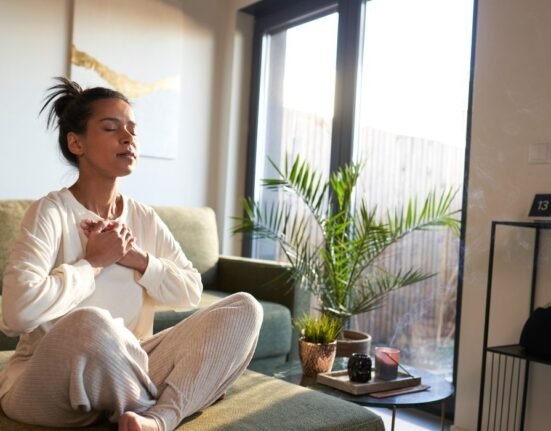The boundary between work and personal life has become invisible in today’s rapidly shifting world. Change is everywhere, and employees are feeling it. After a lot of hard work at the workplace, people still attend phone calls and virtual meetings, and revert to work emails from their homes; these all make employees feel restless and emotionally unsatisfied. The disturbed work-life balance is giving a feeling of incompleteness to the employee. Free evening hours can make a difference in our overall well-being if you use them mindfully. They can help you see within and around you with a clear mind. When you realise that your family and your happiness matter the most, you have made every effort worthy enough. Here are 7 simple evening habits that can help you combat restlessness. And make you feel more fulfilled after work hours.
1. Leaving Behind Work Stress
You feel relaxed when you come home and lie down on your couch. Our body can sense the comfort of our homely vibes, which were stiffened outside. According to the American Psychological Association, “switching off” from work helps you recharge. Work-related digital distractions have to be shut down after work, or else you will remember some unfinished work to complete.

To switch on the home mode, you have to start indulging in self-care activities or household chores like changing clothes, going for a walk, and placing things in the right place. One thing you can do to leave behind occupational stress is you self-talk with positive words, such as “I have finished today’s work, now I deserve to take a rest and spend time with my family.” This little gesture toward you helps you enter in home environment without any work stress and rest your mind. This can lead to relaxation and recovery.
2. Disconnect and Embrace your Physical Surroundings
Digitisation has pros and cons, but if we as employees set some boundaries to digital work connections, then it cannot hamper our mental well-being during non-working hours. A 2021 study by Microsoft found that the average number of meetings per week had increased by over 150% since the shift to remote work. Now, employees are working for more hours than they were before the pandemic.

Being available 24/7 through emails and online platforms can lead to isolation. Digital burnout can come into the frame slowly and unknowingly, making you restless. Without the sound of a notification, your brain might automatically prompt you to check your phone for any important text or email that you might have missed. Never getting a break for your brain might lead to post-work stress.
You should set aside some time in the evening. One hour of your evening should be free from the digital world. So your mind can free some space to enter into mindful activities of self-care. The most important thing is avoiding the screen lights. What to do instead? I think sometimes fantasy escapism is necessary to make you strong enough to face realities, so for that, you can read a physical book. And more we can think beyond work hassles is to indulge in any creative hobby, write a diary, or have a heart-to-heart talk with your loved ones. These intentional rituals can turn into habits. And these habits can relax your mind and body.
3. Gentle Movements to Release Stiffness
A sedentary lifestyle is already affecting our physical health. Work stress, work pressure, and these types of situations keep our body in an alert state, which means a rigid state. Light physical activity is what our body needs after sitting and acting in a formal, restricted environment. Like stretching, walking, yoga, or dancing can help you forget stressful things and shift your attention from overthinking.

Studies show that evening exercise affects the circadian rhythm. People fall asleep easily because of light body exhaustion (Shen, B., Ma et al. 2023). Adding a 30-minute stroll before bedtime can clear your mind, and that can uplift your mood. Many wonders will be seen in terms of improved physical and mental well-being. (The Economics Times, 2024). You don’t have to be in haste while walking, walk as if you are meditating—calmly and at peace.
4. Journal Writing for Fulfilment
Things might appear fine on the outside, but in a heart’s corner, something remains dimly lit, unfulfilled. Have you ever felt unfulfilled after work? If so, it’s likely because you’re neither aware of the reasons behind it, nor acknowledging the positive aspects of your work, or your expectations haven’t been met. Combat this by writing a journal. Especially writing a positive aspect of your work can help you focus on how you are growing, step by step, day by day. Today, you may fail, but tomorrow you may rise above your weaknesses. This is the self-motivation you get from writing a journal.
Remember, sometimes the only person who can truly pat your back is you. This can create intrinsic motivation and joy in your heart; it can push you forward to achieve your dreams.
Writing tips: It should be concise. No need to be in long paragraphs unless you have a hobby of writing. Simple lines can create a sense of fulfilment within you:
“Today I had coffee and a meaningful talk with a friend.”
“I felt more confident while presenting the proposal.”
5. Doing Every Household Chore Mindfully
Meditation is one of the best mindfulness practices for calming down inner turmoil. But some people have no time for formal meditation, amongst other household chores. So, concentrating on any task, whether it is cooking or organising a bookshelf, that focus will be beneficial for maintaining a mindful state of yourself. Without investing separate time for mental wellness, setting up habits of mindful daily routines will engage all your senses and give you a restart kick.
Try this: You should have dinner mindfully. That is to focus on eating from your plate. Sitting at the dining table after unplugging all distractions, chew appropriately (ideally 32 times), and taste each bite.
6. Genuine Connect
Human connection is real medicine to lower post-work restlessness. Fighting your own battles does not mean that you have to live in isolation. For that purpose, we have to leave aside our phones or laptops and avoid spending time in front of the TV, mistaking it for true relaxation. Interacting with close friends can be insightful and therapeutic. The exchange of thoughts and caring words can help you inhale stress-free air.

This emotional connection could be established through playing with children, pet parenting, and deep talk with a partner. Quality over quantity is the solution to reaping the benefits of genuine connection, through which it gives you a feeling of joy and belongingness. Don’t be lazy to initiate a conversation with someone. Even a stranger can become a good friend. Better than spending time alone, you can do online meetings or join social groups.
7. Soothing Bedtime Routine
In the evening hours, choose clothes for tomorrow’s work and organise things that need to be taken with you. But after this ritual, you should be focused on slowing down, dimming the lights, changing into comfortable clothes, playing music, reading a book, and practising relaxing techniques like deep breathing. Protecting your last 30–60 minutes before bed from stress, stimulation, or worry can improve your sleep quality, laying the foundation for a better tomorrow.
Why These Habits Work
You don’t have to do any grand things to feel more fulfilled after work. And for this, one should avoid comparison with others while embracing one’s capacities and needs. Each of these 7 habits makes you feel heard within yourself. They can provide you with mental clarity, emotional connection, and physical relaxation.
The post-work evenings are not just for being on potato couch or scrolling on phones. They are the valuable spaces where you can go through the healing process and make yourself ready for tomorrow. The more you treat them as self-care and restoration routines, the more your body and mind will respond healthily. Resting is a necessity. Make sure you make those resting hours also productive. The realisation will come automatically that restlessness is temporary, and work hours are just one aspect of life. So, taking care of yourself means pampering yourself is important.
FAQs
1. How to mentally switch off from work?
- Turn off digital distractions.
- Create a post-work routine.
- Doing self-care rituals
- Check in your loved one’s
2. What are the signs of work stress?
Depression, anxiety, lower quality work performance, and sleeping problems
3. What jobs are good for work-life balance?
Some job roles are good for work-life balance such as teacher roles, financial advisor, real estate agents, accountant, data analyst, government sector jobs etc.
References +
Shen, B., Ma, C., Wu, G., Liu, H., Chen, L., & Yang, G. (2023). Effects of exercise on circadian rhythms in humans. Frontiers in pharmacology, 14, 1282357. https://doi.org/10.3389/fphar.2023.1282357
Coping with stress at work. (2014, July 1). American Psychological Association. Retrieved May 10, 2025, from https://www.apa.org/topics/healthy-workplaces/work-stress
How to use a 30-minute walk before bed to level up your health. (2024, September 12). The Economic Times. Retrieved May 10, 2025, from https://economictimes.indiatimes.com/news/india/how-to-use-a-30-minute-walk-before-bed-to-le vel-up-your-health/articleshow/113278929.cms
Pellegrini, V. (2022, September 22). Hybrid Work Is Just Work. Are We Doing It Wrong? Microsoft. Retrieved May 10, 2025, from https://www.microsoft.com/en-us/worklab/work-trend-index/hybrid-work-is-just-work













Leave feedback about this